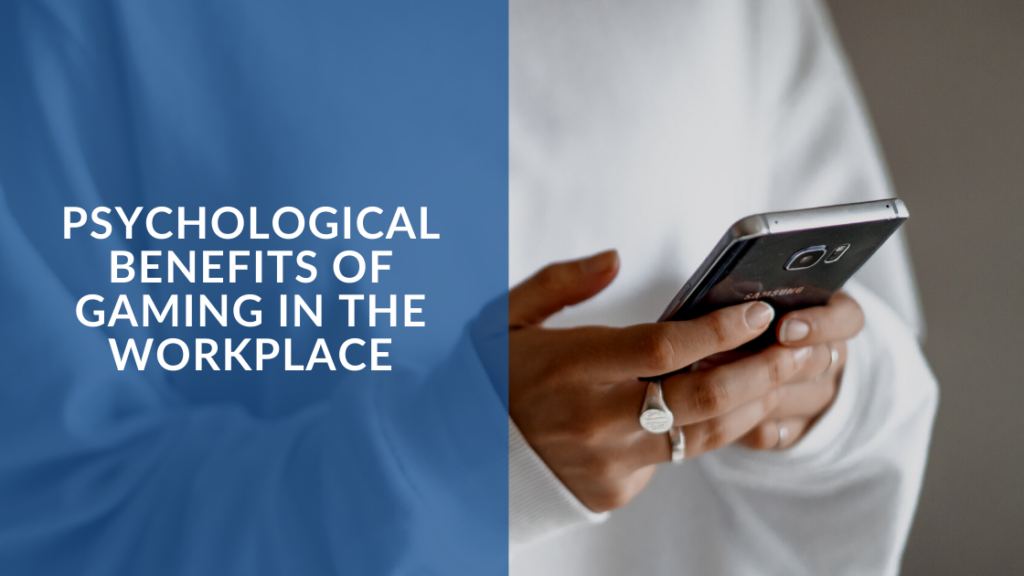The Psychological Benefits of Gaming in the Workplace

While some organizations might frown on entertainment during office hours, many others experience the benefits of gamification at work. Why do some companies back the idea? This guest article from Anna Yurovskikh explains.
Our professional lives get faster and more competitive every day. It’s no wonder people start thinking about alternative ways to improve and streamline work processes.
And these days, this doesn’t just apply to technical processes and systems. It’s also becoming more prevalently focused on the efficiency of individual workers.
But here’s the catch: happiness and job satisfaction go hand in hand, and they both have an impact on productivity.
Enter: gamification at work.
In 2020, the University of Oxford published a study revealing the crucial benefits of gaming for the mental health and well-being of adults and kids. As it turns out, a few fun breaks can be more beneficial than we thought, both for individuals and the business as a whole.
So, what are the advantages that come with the introduction of such changes in the workspace? Read on to find out.
Benefits of Playing Video Games

Breaking the Pattern
Most office employees complete more or less similar tasks every day. So, it’s no wonder the usual routine may start to feel monotonous and boring. However, the introduction of a new fun element can make all the difference, improving job satisfaction and supporting better results.
But what you might not realize is that it’s actually a biological phenomenon: when we break up patterns, our gray matter is stimulated to move, working in a completely different way and building new neural networks.
This, in turn, shakes you up, creates a feeling of happiness, and inspires new ideas.
Virtual entertainment and gamification are boundless and can provide new experiences every day.
Building Bonds
Organizing offline get-togethers is popular in companies that care about team morale. Virtual team building and in-person team building activities empower trust, cooperation, and supportive behavior, and also serve a valuable purpose in onboarding.
But embracing efficient digital tools can also support this process.
Nothing unites people better than a multiplayer match against a common enemy. Or a cooperative strategy where each contributes to the completion of the project. Even a virtual happy hour can do the trick.
Developing Leadership Skills
You probably wouldn’t immediately think of games as a way to strengthen the most vital soft skills for leaders.
But you can actually boost leadership qualities through role-playing games and activities because, in these activities, each participant has a chance to make decisions that matter, in turn boosting proactivity and supporting the development of valuable skills.
Reducing Stress
Workday stressors can add up over time. And by failing to address them, you risk sinking into a burnout state and suffering from depression. It’s bad for you and the whole team due to:
- Lower productivity
- Mistakes
- No creativity
- Lack of development and financial growth
You can help reduce the impacts of these stressors through computer adventures, engaging action sessions, mental games, or other options.
This idea is backed by Leonard Reinecke, a professor in psychology, who published an article in The Journal of Media Psychology proving the effectiveness of gaming in coping with work-related fatigue and other stressful factors.
Fusing Work and Fun
The best games for work are multiplayer matches via local networks. They unite employees’ computers and foster a cooperative/competitive spirit right on spot.
You can also opt for free online games located on https-driven websites. Secured from viruses or criminals, your device is 100% protected when interacting with these kinds of portals. Just make sure your company doesn’t have data filters to restrict access to certain content.
Mental Support Through Gamification

Believe it or not, gamification has long been used to treat various issues in children.
At work, this same approach applies to adults. Gamification has been shown to help people:
- Overcome tragedy: Being distracted by gameplay and plot can help provide a brief but important reprieve from grief. It helps digest bad news and restores back to normality.
- Learn to communicate: Any multiplayer journey has in-built social scripts that people absorb subconsciously. Cooperation with friends and collaborative goals fight the feeling of loneliness and self-isolation.
- Tackle any challenges: If settling in-game problems is your hobby, you won’t be afraid of the real ones. The idea that nothing is unsolvable gets deep into your head. And motivates to approach real problems strategically.
- Be more confident offline: Each title is designed to put you in the center of a bright journey. The sense of accomplishment develops self-esteem and other useful qualities.
Gamification can significantly improve workplace atmosphere and efficiency. But this only applies with a sensible approach. Your fun time should be limited.
And if you’re looking for even more gamification ideas, check out these 30 team-building games to play online with your colleagues.
Do you use gamification at work? If so, how has it worked out? Let us know in the comments section!
Learn More About the Benefits of Gamification at Work?
For more information about how to build more engaged teams with team building games, reach out to our Employee Engagement Consultants.
Author Bio:
Anna Yurovskikh
Anna is a Content Manager at Kevin Games. She is a true fan of online games and is excited about how helpful they could be. Being a passionate investigator, Anna is interested in the psychological aspects of gaming and their positive effect on productivity, mental health and learning.



Thank you, extract a lot of useful information about the losses associated with working with them
I am now trying to create a personal site on the topic of games and it is important for me to draw useful information related to psychology.